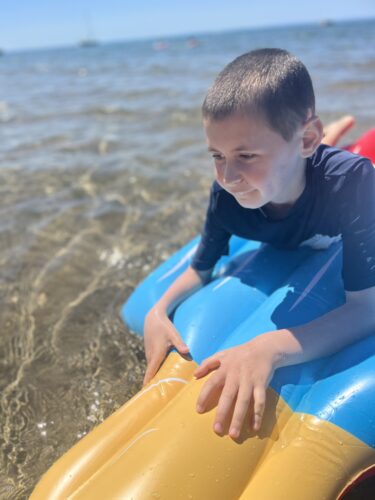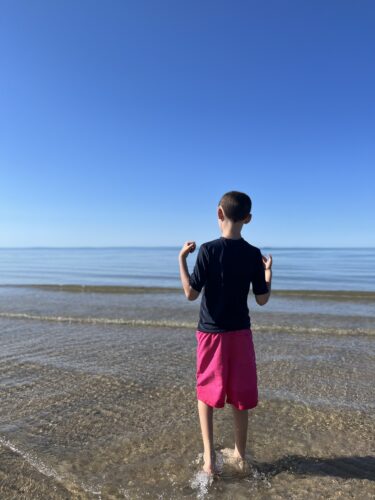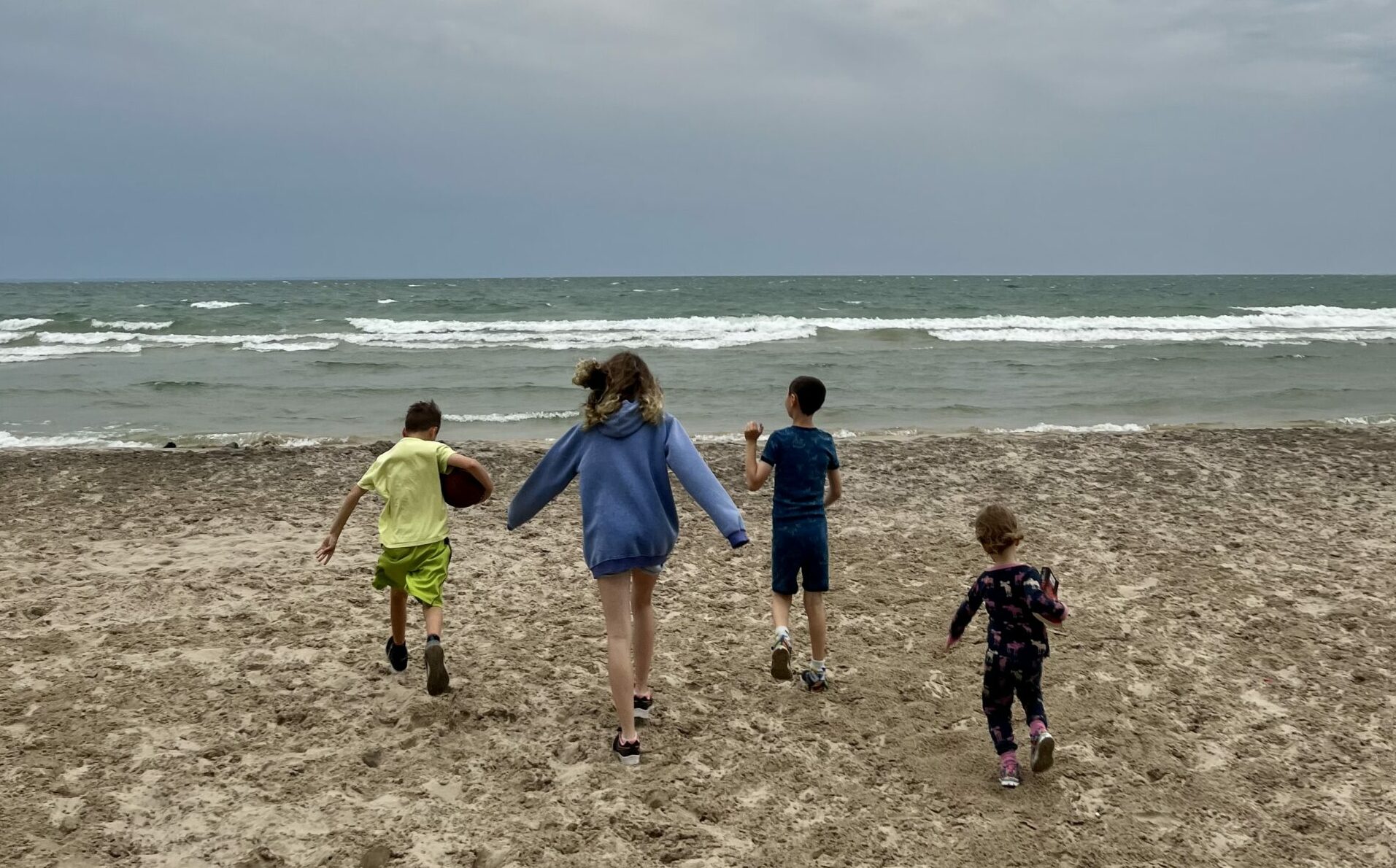My son Isaiah has a complicated rare disease that has, over the years, dropped many other diagnoses into our laps including global developmental delay, autism spectrum disorder, moderate intellectual disability and, most recently, epilepsy. Right now, at eleven years old, Isaiah is happy and playful. He thrives on routine, and like a much younger child, has no ability to reason. His medical team predicts that when he reaches adulthood, developmentally he will be about 7.
Though my son Rivers is two years younger, he is very much the “big brother.” Rivers was five years old when he first told me about his plans to live with his older brother one day, when they became grown-ups. No one has ever communicated to my younger son any expectation that he ever act as a caregiver to his brother. We do, however, perpetuate the message that Isaiah’s safety and well-being prevails. It has to.
His adorable, five-year-old brain had a strategy: On Monday (Day 1) -the obvious- he would get a job; on Tuesday, he would get money from that job; on Wednesday, he would get an apartment with two bedrooms; on Thursday, he would find day programming for his brother to go to while he worked; on Friday, they would go to work and to day programs. Weekends would be for chores and fun. That was how he dreamt of taking care of his brother, when he was not yet old enough to tie his own shoe.
“I just want them to enjoy as much of their lives as they can before that happens,” is what my friend Christine said when I asked her whether she talks to her two older, typically developing children about becoming caregivers to their sister who is a beautiful, smart kid who just happens to have Down Syndrome. She pauses before she says, “No, we don’t really talk about that,” before she says, “but maybe we should.”
Nobody wants to talk about dying. From the secrecy and privacy around wills and last wishes to “do not resuscitate” instructions. We don’t talk about it because we hope it will never happen. Like so many other things, this kind of planning isn’t for you — it’s meant to ease the burden and grief for your loved ones.
Rivers has watched his father and stepfather and I carefully build a future for Isaiah in the background. He has overheard phone calls and read e-mails over my shoulder and he knows that we are constructing lives for all of them, but that the focus for Isaiah is planning a life similar to the one he has now, but without his mom or dad. As much as I like to think I’m invincible, one day I will die, and I need to do what I can to ensure that Isaiah is still cared for. This is what keeps me up at night.

My friend Nick has a younger sister who is in her mid-thirties but very similar to my son, developmentally. She requires round-the-clock care and observation to ensure she is safe and with activities of daily living; like bathing, cooking, and getting from place to place. Nick has never been groomed to become her caregiver. He has a family of his own complete with three young kids — but his parents are 72 and 82, respectively, and while they are fortunate enough to continue to be healthy and youthful enough to care for her, like all good things, that won’t last forever.
Nick’s mom and stepfather, when their daughter is in earshot, refer to their respective departures from Earth or catastrophic declines in health as “going to Australia”.
It was Nick who finally approached his parents about their Australian vacation plans — “I know this is coming,” he said, “And I’m ok with that, but I want to be prepared.” By “prepared”, Nick means he wants all of the information — bank accounts, doctors’ names, places from whom she receives funding and their contacts, her schedule. He wants what we jokingly refer to as “turn-key caregiving”.
And I can’t blame him. Planning is key. With a complete overhaul happening in your life when you take on the care of a family member, whether you were expecting it or not, being armed with information is essential to finding your footing and to decreasing the burden on the new caregiver.
When asked why there hadn’t been big conversations about caregiving throughout his childhood, Nick shared that he truly believes his mother, like Christine, wanted he and his brother to be able to pursue full lives and opportunities no matter what, and that the rest would sort itself out.
In many ways it is the weirdest blessing to have these circumstances to contemplate at all; whereas parents used to outlive their disabled children, advances in research and medicine and supports have created the reverse, and welcome scenario of our kids (rightfully) outliving us more than ever before, leaving us with a million questions, of the kind that keep you up at night ilk: what will happen to our son when we die? We can only plan so much. In disability, as in life, the variables that will swing cannot always be anticipated. And sometimes that pendulum shifts swiftly and like a wrecking ball.
In Isaiah’s case, his expenses in the future aren’t quantifiable and the trajectory of his rare disease cannot be known. We don’t know those routes into his adulthood yet, but we know there are a few certainties: there will be bureaucracy and they will be expensive.

Being a parent to a child with a disability, not only do you have the ordinary stresses that I feel come with parenting, generally, of lying awake at night worried about getting sick yourself, of the curtain closing on your life when your kids are still little, but you have the atypical scenario of a child that will need significant support through adulthood. There is no roadmap for parents of kids with complex disabilities; no pamphlets they hand out pointing you to the places you will need now and in the future.
There is no guidebook for the in between times, either. It’s a life full of pockets of intensive support, and dry, cavernous stretches without any at all. It’s a life where, in many respects, the supports are only as good as the integrity of our governments and the desire for a community to care and advocate for one another.
5.3 million Canadians live with a disability, including 200,000 children and youth. That’s sixteen percent of our country’s population. That means you know someone who has a disability, or who is impacted by one. 1 in 12 people have a rare disease diagnosis, many with accompanying and associated disabilities. You probably know someone who has a rare disease, too.
I have said before that it is an underpinning of ableism that ability equates to worthiness and that, eventually, that unfortunate sentiment extends to the caregivers of persons with disabilities (some of whom, if you can even fathom it, are living with their own disabilities while acting as caregivers) and that you simply become too heavy to hold up, so they keep you down.
To make matters worse many of us have learned the awful lesson that wealth can equate to health. Or at least to better outcomes. And that whiteness, too, is a currency. One you can spend on having calls returned and spots on wait lists bumped up.
I keep this in mind — as someone who has experienced those sentiments in real-time both personally and professionally — when preparing my kids for the possibility (or, more realistically, the inevitability) of becoming caregivers to Isaiah. I do this quietly, with the deep understanding that caregiving for Isaiah does and will involve so much more than ensuring there’s some money to go around. Caregiving after Isaiah means preparing them for a life that always and primarily considers Isaiah, for a life that will bring some disappointments because of your caregiving obligations, for unfair things to happen to you that you don’t have the capacity to fight, and for exhaustion — the kind you only know if you know it.
And we do this all by modeling. We teach the kids how to advocate for Isaiah’s dietary needs, how to prevent Isaiah from walking out the door alone, how to stay safe in water, how to recognize signs of seizures, how to alert an adult to danger. We teach them by demonstrating, step-by-step, how to do things for Isaiah, hoping they will learn through their observations.
When we do talk about it — which isn’t as frequent yet as it will become in the future — we talk about how Isaiah will stay with mom and dad as long as he can. We tell them they do not have to take care of Isaiah in the future if they can’t or, more importantly, if they don’t want to. I know, firsthand, the stresses of being a caregiver. I grew up as one, and grew again into one contemporaneously with motherhood. I want them to always feel they will have a choice, in the hopes that that feeling will create a desire to care for him, or to contribute to his care in one way or another.
In Canada, 7.8 million people are family caregivers. That staggering number represents 1 in 4 Canadians aged fifteen or older. Those caregivers provide an average of nineteen hours per week of care — often on top of other jobs or in addition to the care of other people, like children, in their households. For the ten percent of Canadians who support family members with complex disabilities, it is assumed they can provide up to 70 hours per week of care. And yes, most of this is entirely unpaid. And these are jobs we didn’t apply for. That often, we’re not qualified for, or supported in.
But it doesn’t need to be this way. I recently met with Liv Mendelsohn, who is the executive director at the new Canadian Centre for Caregiving Excellence. The Centre is focused on supporting caregivers and building resources to support and provide community for sibling caregivers by way of Siblings Canada, so that siblings like Nick, Rivers, and Christine’s two sons can be better prepared when the time comes to care for their sibling.
The impact on caregivers, which includes a growing number of siblings of people with disabilities, is incalculable. But there are steps that can be taken to address the issues caregivers have faced for decades — from lost income and employment, to little respite and burnout. The Centre and Siblings Canada are working to advocate for these changes so our kids and the parents behind us don’t face the same challenges that we do now.
Because despite the campaigns, flexed cartoon biceps, and capes, we are not actually superhuman. Or superheroes. We are tired and terrified parents, planning to hesitantly pass the torch onto the kids we only ever wanted the entire world for, knowing their world may become just a bit smaller if that happens.
Charlotte Schwartz is a family law clerk and parent of four children in a blended family. She is an advocate for equal, shared parenting time in separated families and for strong co-parenting relationships. Her first book about co-parenting, Your Place or Mine, will be published by Dundurn Press in September 2022. When she has time, she loves to run aimlessly at low speeds and she is always tired.




 Follow Us On Instagram
Follow Us On Instagram
